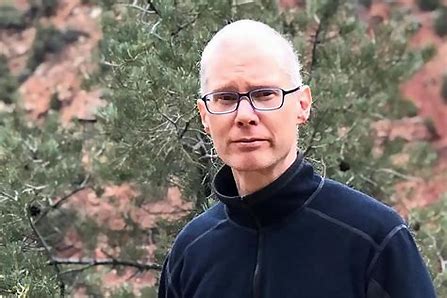In 2018 Chris Gregg was diagnosed with stage 4 metastatic cancer and given 24 months to live.
Like every other patient with a stage 4 cancer considered to be incurable, Chris was told that there was nothing to be done, that he could be kept alive for a year or two with chemotherapy and radiation treatments, but that was it. His cancer was incurable and terminal.
It was a death sentence.
Like every other patient, when Chris heard the words “cancer” and “terminal”, the ground was ripped away from under him. His compassionate oncologist kept talking, explaining what would happen next… but Chris heard none of it. His life was at an end. His children would be left fatherless, his wife would lose her husband, and there was nothing that anyone could do to change that single, inevitable outcome.
Like every other patient, Chris would be dead in under two years.
But Chris was not exactly like every other patient.
Chris Gregg PhD, is a tenured professor and principal investigator at the University of Utah School of Medicine in both the Neurobiology and Genetics departments. He’s a world-leading expert in genomics, epigenomics, and deep phenotypic analyses of complex behavior patterns. He was an early innovator in the genomics revolution at Harvard. He received the Eppendorf & Science Prize in Neurobiology and the NYSCF Robertson-Neuroscience Investigator award. His work has been selected as a top breakthrough of the year by the NIMH in 2010 and again in 2018 by STAT. He’d published papers on cancer. He’s the Chief Scientific Officer of Storyline Health, the world’s most advanced behavioral research platform.
And he’s Canadian, so everyone likes him.
After weeks of the inevitable self-reflection and depression that every diagnosis like this brings, Chris did what perhaps no other cancer patient could have done – what no one else on Earth may have been able to do.
He started reading.
Chris read every recent study and peer-reviewed paper that held promise for treating cancer. Then he read all of the old ones. And, because of his expertise and background, he could understand not only what the summaries claimed, but how valid the underlying ideas, science, and findings were. He could weigh the claims, and see how they might work together and why they might be working at all. He welded together promising cancer theories and new insights from different areas of healthcare, being brutally careful to avoid hyperbole and hope and focus only on proof and an understanding of the underlying biology.
There were studies on drugs and radiation therapies. There were papers on mice, and monkeys, and sharks, and elephants. There were findings on the effects of diet, and sleep, breathing, blood oxygen, and hyperthermia. There were findings from leading institutions, labs, companies, and researchers around the world.
Then there were phone calls. Lots of phone calls.
Chris’s position and reputation allowed him to send an email or make a phone call and get an almost immediate response from anyone, working on anything, anywhere on Earth.
The days stretched into months.
Diet, temperature, oxygen saturation, ph values, sleep… there were studies on everything… everything that could be a potential key seemed to be out there, but there was no plan – no central scientific strategy or position that could tie everything together. It was a hodgepodge of siloed research looking at only part of the problem and finding only part of the solution.
The system works well if you are a drug company.
Academic labs and researchers need funding to do science, and much of that funding comes from pharmaceutical companies.
It seemed all the cancer studies were funded by pharmaceutical companies trying to prove a new drug to take to market. They had the deep pockets that funded the university research labs and clinical trials. They sucked up every cancer patient they could for their studies. Few researchers had an interest in working on areas where funding was scarce and there was no billion-dollar drug at the end.
That is a big part of the problem.
The entire cancer research ecosystem is targeted towards finding a new drug to sell.
It was beyond frustrating because Chris was aware of another single and immutable fact: There will never be a drug that can cure cancer.
Chris is working to not only prolong his life but also that of others.
Here are a few interesting articles on Christopher and his work:
https://gregglab.neuro.utah.edu/

